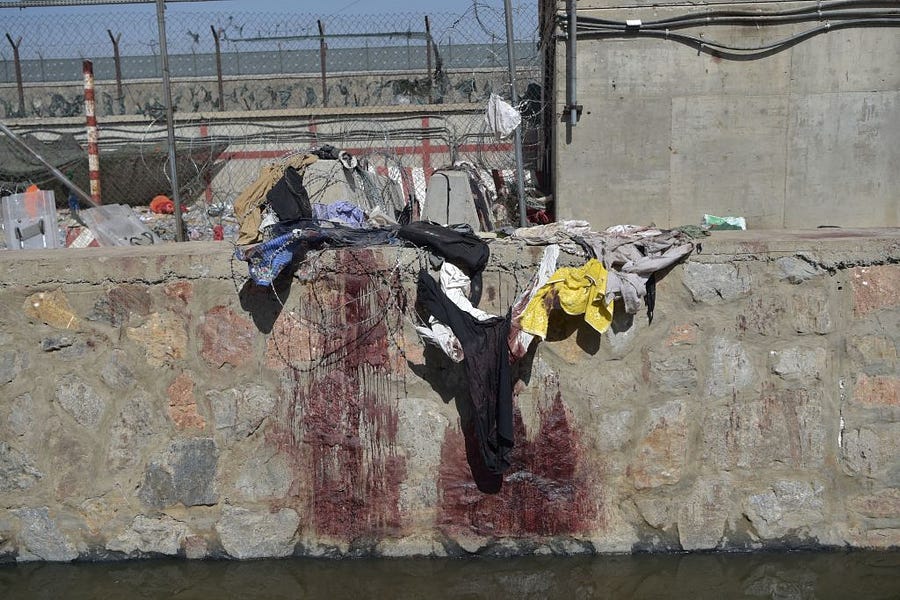We’ve spent a lot of time the last few weeks focusing on everything that has gone wrong in Afghanistan and criticizing those whose decisions led to this embarrassing moment for America: The Biden administration, not just for the rushed and chaotic withdrawal, but its absurd insistence that this was unavoidable, and well—actually—everything is going just fine. The Trump administration, for negotiating a bad deal in the first place. We’ve been hard on the politicians who are speaking out against bringing in Afghan refugees, and (as you’ll read below), we’ve sought to remind people that Pakistan was part of the problem, for supporting the Taliban and al-Qaeda while taking aid from the United States.
It’s gotten hard to find the right words to discuss what has happened. Two weeks ago I described it as “frustrating.” Last week felt “bleak.” After the bombing Thursday that killed 13 U.S. servicemembers and upward of 170 Afghans, “grim” doesn’t quite cut it. Neither does “maddening.”
So I’m going to hit pause on the negativity, just for a moment. ABC News broke a truly remarkable story yesterday, at precisely the moment we needed some hope. A group of special ops veterans—all volunteers—had been ferrying Afghan commandos and interpreters and their families to the safety of the Kabul airport. After rescuing 130 people over the first 10 days after Kabul fell, they incredibly managed to rescue 500 more overnight on Wednesday:
“Dozens of high-risk individuals, families with small children, orphans, and pregnant women, were secretly moved through the streets of Kabul throughout the night and up to just seconds before ISIS detonated a bomb into the huddled mass of Afghans seeking safety and freedom,” Army Lt. Col. Scott Mann, a retired Green Beret commander who led the private rescue effort, told ABC News.
There will be time later to reflect on the fact that veterans who had already risked their lives in service to our country felt obligated to do so once again to rescue those who had helped them, since no one else was. But for now, when it feels like we’re in a moment of decline, it’s an important reminder of what has made America great. And it’s going to make one heck of a movie.
Those brave vets weren’t the only ones taking risks. Lt. Col. Stuart Scheller, a Marine infantry officer, posted a video online criticizing military leaders for the way the withdrawal was conducted.
Scheller predicted that the video would end his military career, and he was correct. He was relieved of his duties almost immediately. And his response is another cause for hope: “My chain of command is doing exactly what I would do … if I were in their shoes,” he posted on Facebook after acknowledging his firing.
“America has many issues… but it’s my home… It’s where my three sons will become men. America is still the light shining in a fog of chaos. When my Marine Corps career comes to an end, I look forward to a new beginning. My life’s purpose is to make America the most lethal and effective foreign diplomacy instrument. While my days of hand to hand violence may be ending … I see a new light on the horizon.”
The Afghanistan withdrawal is a stain on our country’s history that is bound to invite further challenges. The Taliban and al-Qaeda are emboldened by our defeat. Adversaries like China and Russia are no doubt watching.
When we are tested, we’re going to need people with the bravery of the vets who went to Afghanistan to rescue their allies, and people with the honor of Stuart Scheller.
Thanks for reading, and please check out the important work we did this week.
The past two weeks have seen increasingly hard to believe news stories out of Afghanistan: Kabul falling to the Taliban in days rather than months, desperate Afghans falling from U.S. airplanes, parents passing children over barbed-wire fences to U.S. soldiers. But even with that—and even with warnings of potential terror attacks—the bombing that killed hundreds, including 13 U.S. troops, was a shock unlike any other. In a rare staff editorial, our editors decried the gobsmacking statements coming out of the White House—that the airlift is some kind of triumph, that these events were unavoidable—and took the Biden administration to task for the fiasco that has resulted from its decision to withdraw. “The best case for leaving some American troops in Afghanistan was never grounded in talk of ‘nation building’ or love of ‘forever wars,’ but in America’s core national security interest. Preventing the Taliban from taking over Afghanistan is in our interest because the Taliban is our enemy.”
We can debate many things about the war in Afghanistan: specific policies, mission creep, troop drawdowns, surges, etc. (And in fact, Paul Miller detailed the blunders by every administration to oversee the Afghan War just last month for The Dispatch.) But one thing that has never been questioned, as veteran Steve Stampley notes, is the moral legitimacy of our efforts. We were the good guys, he writes. Objectively. And there is danger in forgetting that. “Yet, since the advent of the Trump administration, our nation has moved with alarming speed to reject the fundamental truth that America’s strength in the world is a worthwhile force for good. This is a catastrophic mistake.”
As Danielle Pletka notes, there is plenty of blame to go around for the debacle in Afghanistan. But not enough attention has focused on Pakistan. Pakistan aided our anti-Soviet intelligence efforts throughout the Cold War and helped funnel money to the mujahideen after the Soviets invaded Afghanistan in 1979.* But it also helped give rise to the Taliban, and provided a safe haven for many jihadists—including Osama bin Laden, of course—after 9/11. “Pakistan has long profited by playing both sides, taking arms and dollars from the United States to defeat enemies in turn supported directly by Islamabad,” she writes. “And Pakistan’s American supporters—many in the military who trained with Pakistani officers, others in the intelligence community who have worked with their counterparts for years—have regularly won the day against critics, arguing there is no counterterrorism fight without Pakistan.”
The Islamic State-Khorasan Province claimed responsibility for the bombing outside the Kabul airport that killed 13 U.S. service members and more than 100 Afghans. Thomas Joscelyn offers up a primer of who the group is, why these jihadists don’t get along with the Taliban and al-Qaeda, and what kind of threat ISIS-K is outside of Central and South Asia. And then he tackles the tricky question—if ISIS-K is our enemy and the Taliban is its enemy, does that mean we should rely on the Taliban at least a little bit? “Sometimes the enemy of my enemy is just my enemy—not my friend,” he writes. “Such is the case with the Taliban.”
Now, the best of the rest:
-
Months after Arizona Senate Republicans hired Cyber Ninjas—notably not an election firm—to carry out its unofficial audit of Maricopa County’s ballots from the 2020 election, the company’s report is expected soon. And ahead of its release, election officials are pushing back on expected claims of voter fraud and disinformation. Check out Khaya’s report.
-
Even before the horrific bombing on Thursday, our handling of Afghan refugees has been disastrous. Amanda Rothschild is reminded of the mid-1940s, when Treasury Secretary Henry Morgenthau Jr. worked to expose negligence in processing visas for Jewish refugees and alerted FDR. She calls on someone—maybe Samantha Power or Antony Blinken—to take the same step with Joe Biden.
-
The Biden administration has approved third doses of the mRNA COVID vaccines for all Americans. James Capretta and Keiran Allsop take a look at what this means for our commitment to deliver vaccines to countries in need.
-
Folks, we have a problem with math. Not necessarily addition or subtraction or even pre-calc. Just with big (really big) numbers. In Capitolism, Scott Lincicome breaks down why this is really bad: People, thanks in part to bad reporting, misunderstand the threat posed by COVID to vaccinated people. It creates bad public policy, with multitrillion dollar spending packages and politicians who think we can pay for them by taxing billionaires.
-
We can’t forget the pods: On Advisory Opinions, David and Sarah are joined by Mitchell Berman for a discussion on the jurisprudence of sports. Come for the curling talk, stay for the robot umpires. On The Dispatch Podcast, Rep. Mike Gallagher expresses his frustration with the Afghanistan debacle in a conversation with Steve and Sarah. And on The Remnant, Jonah and A.B. Stoddard hit on all the hot-button topics: infrastructure, racial progress in America, COVID, and Afghanistan.
Correction, August 28: This piece initially reported an incorrect date for the Soviet invasion of Afghanistan.









Please note that we at The Dispatch hold ourselves, our work, and our commenters to a higher standard than other places on the internet. We welcome comments that foster genuine debate or discussion—including comments critical of us or our work—but responses that include ad hominem attacks on fellow Dispatch members or are intended to stoke fear and anger may be moderated.
You are currently using a limited time guest pass and do not have access to commenting. Consider subscribing to join the conversation.
With your membership, you only have the ability to comment on The Morning Dispatch articles. Consider upgrading to join the conversation everywhere.